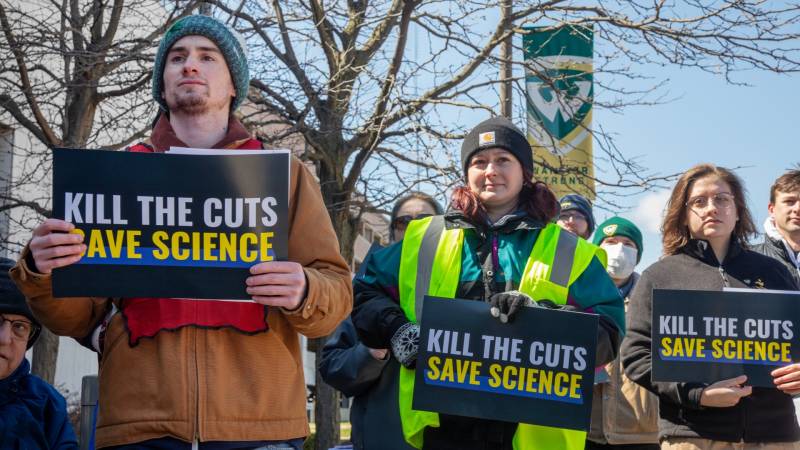Five former directors of the National Weather Service released a joint letter on Friday warning about the impact of major cuts to the National Oceanic and Atmospheric Administration that they say will result in less accurate weather reports and storm warnings that could put lives at risk. NOAA is just one scientific organization facing widespread cuts. From NASA to the National Institute of Health to the National Science Foundation, public research institutions have taken massive blows. We talk with reporters and a former NSW director about the future of science in the Trump Administration and beyond.
What Trump’s Massive Cuts Mean for Science and Research

Guests:
EW (Joe) Friday, former director, National Weather Service
Katherine Wu, staff writer, The Atlantic
Geoff Brumfiel, senior editor and correspondent, NPR's science desk
Show Highlights
Impact of Trump Administration’s Cuts on National Weather Service
Joe Friday, a former director of the National Weather Service, warns that recent leadership decisions and budget reductions have undercut the agency’s forecasting capabilities. First, eliminating probationary hires has driven out “the best and brightest” new talent. Second, overall staffing has fallen below 4,000—its lowest level in at least a century—forcing seasoned forecasters to cover larger territories with fewer resources.
As a result, Friday notes, model accuracy has already dropped by roughly ten percent within the last day’s worth of data.
Potential Loss of Crucial Scientific Data and Research
These cuts risk severing essential data streams and derailing long‐term studies that drive innovation and public health. NPR’s Geoff Brumfiel warns that dismantling the atomic spectroscopy group at the National Institute of Standards and Technology would undercut industry research and development and hamper researchers worldwide.
Catherine Wu of The Atlantic cautions that ending decades‐long health cohorts—like those tracking people with diabetes into old age—breaks a continuity that can’t simply be restarted from scratch.
And as caller Miriam points out, the Traumatic Brain Injury Model System database follows over 20,000 individuals to assess which treatments work and where new research is needed. Losing that database would erase years of invaluable insight.
Early Career Scientists at Risk of Leaving Field
Early-career researchers are at particular risk of being driven out of science entirely. Mary, whose own child is just starting a research career, says: “It’s very upsetting to watch people launch their professional lives and then to be living and working in this environment.”
Wu adds that countless scientists have already lost their federal grants, leaving them no choice but to shut down their labs, let go of staff, and walk away from academia for good.
Privatization Threats to Public Good Institutions
Friday explains that shifting the National Weather Service to a private model risks eroding its universal coverage mandate. He acknowledges that private weather services have operated abroad—only to be discontinued later—but argues that a truly nationwide provider must remain public. “If you’re going to serve everybody in this country, you have to have an organization that can do that,” he says. Without a public backbone, privatization could leave rural or low-profit regions underserved.
Science Becoming Politicized and Targeted
Brumfiel observes that high‐profile crises—like the COVID-19 pandemic and the escalating effects of climate change—have thrust science into the political spotlight. He says that proposed federal budgets slashing research funding reflect not only policy debates but also widespread frustration over how these crises were handled.
Wu adds that many policymakers view scientific institutions through an ideological lens, and once science is associated with particular political agendas, it becomes a convenient target. Undermining agencies that support and advance research, she warns, risks crippling a system designed to inform public decision‐making and drive national progress.
Long-Term Consequences for U.S. Scientific Leadership
These deep cuts jeopardize America’s hard–won status as a global research powerhouse. “I’ve never seen anything like this,” Bumfiel admits. In his long career, he has seen past administrations reshuffle priorities, but this wholesale slashing of science is new, and risks more than a temporary setback.
Critical programs may stall, emerging talent could seek opportunities abroad, and rival nations stand ready to fill the void, collectively eroding U.S. influence in the world’s scientific and technological arenas.
This content was edited by the Forum production team but was generated with the help of AI.